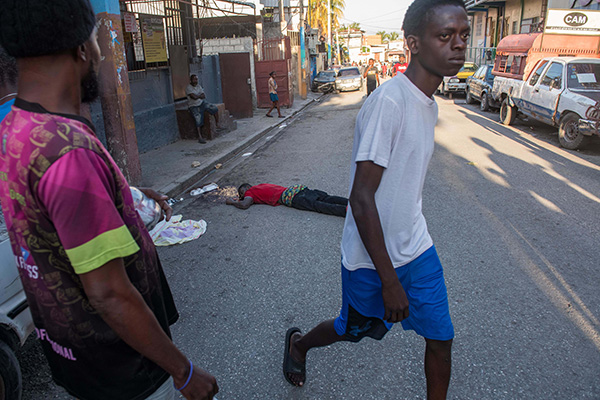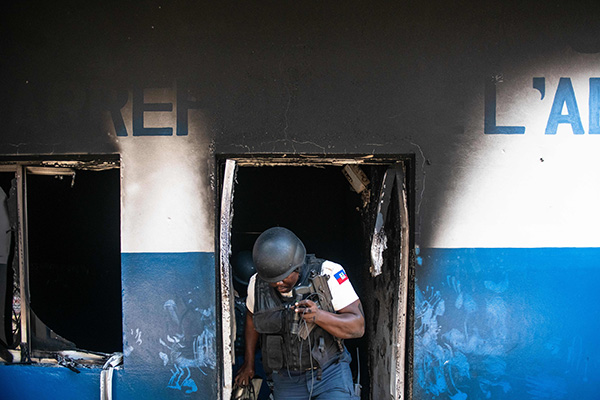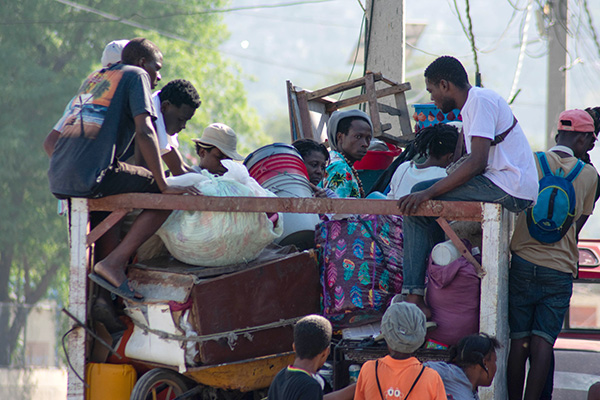Hopeless Haiti
Gregory Hood, American Renaissance, March 7, 2024
Subscribe to future audio versions of AmRen articles here.
“Haiti in Turmoil” is an evergreen headline. Ever since independence, the country has been a disaster, spiraling from one crisis to another. The catastrophe that is Haiti was universally recognized until recently, with countless jokes and pop culture references. That changed when President Donald Trump reportedly referred to it as a “s**thole country,” leading celebrities such as Conan O’Brien gamely to try to present it as an inspiration, despite his own past jokes. During the George Floyd protests of the 2020 “racial reckoning,” some protesters looked to Haiti for inspiration.
Google “Haiti 1804” These signs were seen in 2020 during the BLM riots. pic.twitter.com/cfmd48NsW0
— CLOSE THE BORDER! Mom of 4. (@COPDLiving) March 5, 2024
Perhaps the determination to avoid granting that President Trump had a point explains the light coverage of Haiti’s latest troubles. The island is approaching pure anarchy. In July 2021, assassins posing as American DEA agents killed Haitian president Jovenel Moise in his home and wounded his wife. About two weeks ago, she was among those indicted for the murder. It puts talk in America about a weaponized justice system in perspective.
Haiti hardly has a government. In January 2023, the last elected officials left office, because there have been no elections since their terms expired. In October, the UN Security Council (with Russia and China abstaining) voted to send a peacekeeping force to the island headed by Kenya, with American funding of about $200 million. The current acting president and acting prime minister is Ariel Henry, who has hung on despite the end of his term. Many Haitians think he is illegitimate and that peacekeeping would be an attempt to prop him up. Kenya’s High Court said sending police officers to Haiti would be “unconstitutional.”
About a week ago, Prime Minister Henry went to Kenya to try to save the plan. In his absence, gangs in the capital, who already controlled much of Port-au-Prince, attacked police stations and called for his resignation. The government — or what passes for it — declared a state of emergency. Soon afterward, the prime minister’s whereabouts became a mystery, before he suddenly reemerged in Puerto Rico, apparently under the auspices of the United States. Our government wants him to “expedite the transition to an empowered and inclusive governance structure.” Caribbean nations want him out now. In Kenya, someone asked if it was safe for him to go home. He reportedly shrugged, but says he wants to return.

Kenya’s president William Ruto (R) and Haiti prime minister Ariel Henry (L), at the signing of a security agreement in the State House, Nairobi, Kenya, March 1, 2024. (Credit Image: © Kenya State House Handout/EFE via ZUMA Press)
It’s not clear he can. Gangs want him gone immediately, and seem to want to take over themselves. Last weekend, they attacked two of the country’s biggest prisons, freeing about 4,700 inmates and presumably gaining reinforcements.

People walk in front of the Haitian National Penitentiary after the attack on March 2 by armed gangs in Port-au-Prince. (Credit Image: © Johnson Sabin/EFE via ZUMA Press)
Earlier this week, they attacked Toussaint Louverture International Airport, exchanging fire with government troops before being driven back. At least one policeman was killed. The airport is closed anyway, so there’s nowhere for the prime minister to land, and the neighboring Dominican Republic has refused to let him in. The United Nations estimates that gangs control about 80 percent of the capital. Bodies are left on the streets.

A man walks past a body of a dead man in Port-au-Prince, March 3, 2024. (Credit Image: © Johnson Sabin/EFE via ZUMA Press)
Gangs are also stepping up kidnappings. About 2,500 people were kidnapped last year. CNN says the most-shared videos in Haiti are torture videos of kidnapping victims.

A police officer leaves the Carrefour Aeroport police station, which was set on fire on March 4 by gang members, in Port-au-Prince. (Credit Image: © Johnson Sabin/EFE via ZUMA Press)
Who are the gangs? The most powerful leader is Jimmy Cherizier, a former police officer known as “Barbeque.” He claims it’s a class rebellion, and blasts other countries for supporting the prime minister and a “small group of rich people living in big hotels [deciding] the fate of people living in working-class neighborhoods.” Unemployment in Haiti even before this crisis was 14.9 percent. “Barbeque” says Haiti must become “a paradise for all of us or a hell for all of us” and that there could be a “civil war that could lead to a genocide.” He calls the notorious Francois “Papa Doc” Duvalier, the longtime Haitian dictator, an inspiration. Mr. Cherizier seems to have some political acumen, heading a kind of federation of gangs called the G9 Families and Allies. He claims to be trying to capture police chiefs and government ministers.
A rival gang is the 5 Seconds Gang, headed by Johnson Andre, aka “Izo.” Some kind of alliance will be needed if gangs want to take over, because there are about 200 of them. Another key leader who agrees with “Barbeque” on ousting the current prime minister is Guy Philippe, another former policeman. He leads the Brigade for the Security of Protected Areas (B-SAP). American officials arrested and convicted him of money laundering, but he was sent back to Haiti, with predictable results. He may want to be president, himself.
The gangs are better armed than they were a decade ago, with smugglers delivering rifles and pistols from the United States. About 15,000 people have left their homes because of the violence, joining about 313,000 who were already displaced. A crackdown on gangs is unlikely. Police say 3,000 out of 15,000 officers abandoned their posts in the last two years, and that number has surely increased. The economy is at a standstill because gangs have taken control of roads. CBS says they are massacring people indiscriminately, though their political objectives suggest there may be more to it than simple mayhem.

People carry their belongings during acts of looting in the city center of Port-au-Prince, March 2, 2024. (Credit Image: © EFE via ZUMA Press)
The United Nations says that it is “running out of time” to save lives. In 2023, about 4,700 people were killed, double the number in 2022. An estimated 1,200 people have been killed so far this year. “The violence cannot continue; it must stop,” said UN humanitarian coordinator Ulrika Richardson, pointlessly.
Haiti shares the island of Hispaniola with the Dominican Republic. The republic will not open refugee camps for fleeing Haitians and is building a fence to keep them out. Haitians are likely to try to come here. The Biden Administration released thousands of them into the country while trying to step up deportations. It also increased parole and family reunification for Haitians. The Migration Policy Institute reports that Haitian immigrants have “significantly lower incomes” than both American and foreign-born populations in the United States. About 15 percent are poor. With the election in November, President Biden better think twice before letting in another flotilla.
Some media blame America or whites for the chaos. The Nation says “we” made the mess in Haiti — it’s part of “decolonization.” The Guardian argues that the roots of the mess may even be traced back to the “grotesque impact of the vast ‘reparations’ Haiti was forced to pay to France for generations after independence in 1804.” The Washington Post says America’s history of interventions in Haiti was “ugly” and that “there was little evidence that these interventions had helped Haitians.”
Haiti has been the poster child for decolonization, abolition, and militant black “liberation.” Its history begins with the slaughter of the French and it is very close to a pure black ethnostate. The result was predictable: like Zimbabwe, post-apartheid South Africa, and many American cities after white flight.
A previous American Renaissance article notes that most of Haiti’s leaders up to 1994 were either killed, went missing, or ran away.
| Name | Ruled | Fled |
|---|---|---|
| Jean-Jacques Dessalines | 1804-06 | shot |
| Henri Christophe(“King” of North Haiti) | 1807-20 | suicide |
| Alexandre P”tion | 1807-18 | died of disease |
| Jean-Pierre Boyer | 1818-43 | fled to France |
| Charles Herard | 1843-44 | fled |
| Philippe Gu”rier | 1844-45 | died of old age |
| Jean-Louis Pierrot | 1845-46 | unknown |
| Jean-Baptiste Riche | 1846-47 | unknown |
| Faustin Soulouque | 1847-59 | fled to Jamaica |
| Fabre Geffard | 1859-67 | fled to Jamaica |
| Sylvain Saenave | 1867-69 | executed |
| Nissage Saget | 1870-74 | retired |
| Michel Domingue | 1874-76 | fled to Jamaica |
| Boisrond Canal | 1876-79 | fled to Jamaica |
| E. F”licit” Salomon | 1879-88 | fled to France |
| F. Florvil Hyppolite | 1889-96 | died of apoplexy |
| Tir”sias Simon Sam | 1896-1902 | fled |
| Nord Alexis | 1902-08 | fled to Jamaica |
| Antoine Simon | 1908-11 | fled to Jamaica |
| M. Cincinnatus Leconte | 1911-12 | blown up |
| Tancr”de Auguste | 1912-13 | poisoned |
| Michel Oreste | 1913-14 | fled to Jamaica |
| Oreste Zamor | 1914 | murdered in jail |
| J. Davilmar Th”odore | 1914-15 | fled |
| J. Vilbrun Guillaume Sam | 1915 | dismembered |
| American Occupation | 1915-1934 | |
| St”nio Vincent | 1930-41 | resigned |
| Elie Lescot | 1941-46 | fled to Florida |
| Dumarsais Estime | 1946-50 | overthrown |
| Paul Magloire | 1950-56 | overthrown |
| J. Nemours Pierre-Louis | 1956-57 | resigned |
| Franck Sylvain | 1957 | overthrown |
| Daniel Fignole | 1957 | overthrown |
| Fran”ois Duvalier | 1957-71 | died of disease |
| Jean-Claude Duvalier | 1971-86 | fled to France |
| Henri Namphy | 1986-88 | stepped down |
| Leslie Manigat | 1988 | overthrown |
| Henri Namphy | 1988 | overthrown |
| Prosper Avril | 1988-90 | fled |
| Ertha Pascal-Trouillot | 1990 | taken hostage |
| Jean-Bertrand Aristide | 1991 | fled to America |
| C”dras junta | 1991-94 | deposed |
| American Occupation | 1994 |
In 1994, provisional president Emile Jonassaint managed to step down with help from the United States and die of old age. He was replaced by Jean-Bertrand Aristide, who served from 1994-1996 and is still alive.
He was replaced by Rene Preval, who was the first elected head of state to serve a full term and the first peacefully to transfer power. He was replaced by his predecessor, Mr. Aristide, in 2004, who was ousted by a military coup in 2004. The chief justice, Boniface Alexandre, became provisional president until he was replaced by Rene Preval again in 2006.
His replacement was a street musician known as “Sweet Micky,” Michel Martelly, who served from May 2011 to February 2016. Though he pledged to fight corruption, he was accused of corruption himself and he had many fights with Parliament. He resigned in 2016, briefly leaving the country without a president, until replaced by provisional president Jocelerme Privert. He served for about a year until he was replaced by the unfortunate Jovenel Moise, who was assassinated in 2021. Claude Joseph became the new president, though there were disputes about his succession. He was replaced by Ariel Henry, the current incumbent and the man the gangs want out.
This was a relatively peaceful period for Haiti and now, even this tenuous peace has collapsed. President/Prime Minister Henry seems to have little legitimacy, but no one else can take power legally. Perhaps soon we will be hailing President “Barbeque,” depending on how he fares in the gang wars. The country is an instructive example of ”black empowerment.” Whatever happens, somehow America will foot the bill. Black “liberation” never means we can stop writing checks.















